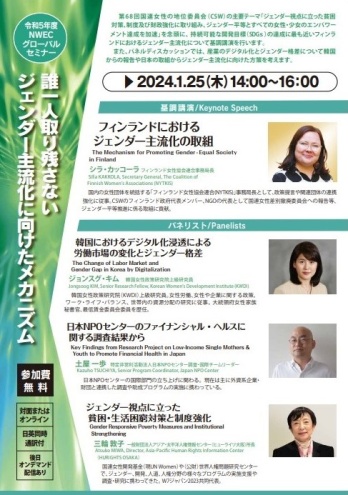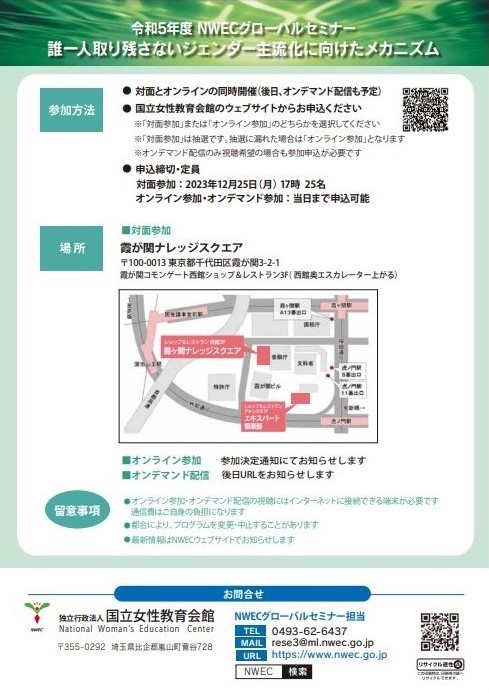International Cooperation
- HOME
- International Cooperation
- NWEC Global Seminar
- FY2023 NWEC Global Seminar: Gender Mainstreaming & Strengthening Institutional Mechanism with Gender Perspective
NWEC Global Seminar
- Event Report
-
FY2023 NWEC Global Seminar: Gender Mainstreaming & Strengthening Institutional Mechanism with Gender Perspective
Date:Thursday 25th January 2024
Place:Kasumigaseki Knowledge Square /
National Women's Education Center of Japan will hold 2023 NWEC Global Seminar featuring "FY2023 NWEC Global Seminar: Gender Mainstreaming & Strengthening Institutional Mechanism with Gender Perspective".
An expert from Finland will give a keynote speech.
On January 25 2024 (Thu), FY2023 NWEC Global Seminar was held at Kasumigaseki Knowledge Square (Chiyoda City, Tokyo) based on the theme of “Gender Mainstreaming & Strengthening Institutional Mechanism with Gender Perspective.”
There were over one hundred participants from Japan and overseas, in-person and online joining the lively discussion.
〇Keynote Speech “The Mechanism for Promoting Gender-Equal Society in Finland” Silla KAKKOLA, Secretary General, The Coalition of Finnish Women's Associations (NYTKIS)
The keynote speech was a wide-ranging introduction by Silla KAKKOLA that covered trends and current issues in gender mainstreaming in Finland. Based on active women's movements in Finland, the right to vote (in national elections) for women was realized in 1906, a first in Europe, as well as women's eligibility to be elected for office, the first in the world. Even when looking at things internationally, women's government participation in Finland has been proceeding from an early period. They also have strong systems for evaluating efforts for gender equality in the government, including Ombudsman, Unit, and Council for gender equality.
Yet it can still be said that there are issues in Finland. One in three women has experienced intimate partnership violence or threats of it. And even though Finland is considered as a welfare state, because of gender segregation at work, the reality is that women’s pensions are 24% less than men’s. It is clear Finland and Japan share the same kinds of lingering issues.
Ms. KAKKOLA belongs to the NYTKIS, which is an umbrella organization founded in 1988. The NYTKIS has had a strong impact on gender mainstreaming in Finland. They tackle both Finnish and international issues, and their goals are the achievement of true gender equality and the maintenance of world peace. In 2023, NYTKIS also promoted the establishment of the criminal code definition of rape based on the absence of consent.
Ms. KAKKOLA quoted “Women’s rights are human rights.” She stated that it is important not to take rights gained for granted but to actively defend these rights.
 Keynote Speaker Ms. Silla KAKKOLA
Keynote Speaker Ms. Silla KAKKOLA
 ”Women’s rights are human rights”
”Women’s rights are human rights”
〇Panel Presentations
The panelist reports were on the current state of, and issues regarding, gender mainstreaming in South Korea and Japan in the economy, family finances, and care work, with recent trends such as the Pandemic and digital transformation as the background, as well as the latest efforts.
“Digital Transformation, Labor Market, and Gender Gap in Korea” (Video) Jongsoog KIM, Senior Research Fellow, Korean Women’s Development Institute (KWDI)
Dr. Kim discussed the latest research results regarding the digital transformation in Korea as well as its influence on the labor market and gender gap.
Now the digital transformation is progressing in Korea, but the current reality is that it is not necessarily leading to the dissolution of wage gaps between men and women. Reasons given for this include the skill gap, stereotypes, and gender segregation in the labor market. In Korea, the government is involved with policies regarding these issues. Dr. Kim reported that they are making efforts to encourage women entrepreneurs, implement digital training, and promote the participation and activity of women in STEM fields.
 Dr. KIM reports on the current situation in Korea
Dr. KIM reports on the current situation in Korea
“Key Findings from Research Project on Low-Income Single Mothers & Youth to Promote Financial Health in Japan” Kazuho TSUCHIYA, Senior Program Coordinator, Japan NPO Center
Dr. TSUCHIYA reported on results from wide-ranging research that covered topics from income and expenditures in the household budgets to financial literacy of low-income single mothers.
"Financial health" refers to “a measure of health regarding money, indicating a state of well-balanced income and expenditure, an ability to withstand some income fluctuation, and an ability to understand and utilize finance”. According to the survey, it is clear they are suffering economically and require support. However, there is a gap between government support and single mothers' needs. Dr. TSUCHIYA pointed out that it is important to acknowledge the financial difficulties borne by single mothers are issues of social structures, and that we need to provide comprehensive support to at-risk group with disabilities and eliminate the social isolation single mothers feel.
 Dr. Kazuho TSUCHIYA
Dr. Kazuho TSUCHIYA
Gender Responsive Poverty Measures and Institutional Strengthening Atsuko MIWA , Director, Asia-Pacific Human Rights Information Center (HURIGHTS OSAKA)
Ms. Miwa reported on poverty measures and institutional strengthening from the perspective of “Care Economy”.
“Care Economy” refers to the “provision of care and well-being of society firmly situated at the center of economic policies”. s Many women engage in non-regular employment in care work and were laid off during the economic recession due to the Pandemic, so “Feminization of Poverty” exacerbated around the world. The Pandemic led to increases in care work and economic worries due to temporary layoffs, and the number of women who committed suicide in Japan in 2020 and 2021 drastically increased. Ms. MIWA pointed out that this situation is against public good, and that the establishment of care systems that do not depend on unpaid work and the appropriate financing are necessary, upon fair recognition of care work.
 Ms. Atsuko MIWA
Ms. Atsuko MIWA
〇Panel Discussion
During the panel discussion, Dr. Jiso YOON (Director, Center for International Development and Cooperation, KWDI) participated. After a Q&A session, panelists offered proposals for gender mainstreaming.
From the audience there was a question regarding advice for Japan, on the issue of paternity leave in Finland. Ms. KAKKOLA stated that in order to involve men in childcare, society must acknowledge men’s right to participate in childcare.
Ms. KAKKOLA asserted that for gender mainstreaming, first of all, gender-disaggregated data is needed, as well as horizontal cooperation at all steps based on this data, from reforming of societal structures to actual policy implementation.
Dr. YOON pointed out the need for people to understand that gender mainstreaming is a high priority job that governments should make efforts towards.
Ms. MIWA proposed that for gender mainstreaming, incorporating gender perspectives in economic policy is important. Dr. TSUCHIYA proposed that there should be efforts towards reforms of societal structures, support for private organizations, and horizontal cooperation.
 Panel Discussion
Panel Discussion
Participants learned progressive efforts in Finland and the societal background that made them possible, as well as digital transformation in Korea and the current state of its impact on the gender gap.
There are also many common issues among the three countries, which must be tackled by as global challenge we all face.
International Cooperation
- International Seminar
- FY2019 Seminar for Gender Equality Officers and Women Leaders in the Asia Region
- FY2018 Seminar for Gender Equality Officers and Women Leaders in the Asia Region
- FY2017 Seminar for Gender Equality Officers and Women Leaders in the Asia Region
- FY2016 Seminar for Gender Equality Officers and Women Leaders in the Asia Region
- FY2015 Seminar for Gender Equality Officers and Women Leaders in the Asia Pacific Region
- FY2014 Seminar for Gender Equality Officers and Women Leaders in the Asia Pacific Region
- FY2013 Seminar for Gender Equality Officers and Women Leaders in the Asia Pacific Region
- FY2012 Seminar for Gender Equality Officers and Women Leaders in the Asia Pacific Region
- FY2011 Seminar for Gender Equality Officer and Women Leaders in the Asia Pacific Region
- FY2010 Empowerment Seminar for Women Leaders in the Asia Pacific Region
- FY2009 Empowerment Seminar for Women Leaders in the Asia Pacific Region Final Report
- FY2008 Empowerment Seminar for Women Leaders in the Asia Pacific Region
- FY2007 Empowerment Seminar for Women Leaders in the Asia Pacific Region
- FY2006 Empowerment Seminar for Women Leaders in the Asia Pacific Region
- NWEC Global Seminar
- FY2025 NWEC Global Seminar: Addressing Technology-Facilitated Gender Based Violence (TFGBV): Approaches to Eradicate the Invisible Harm
- FY2024 NWEC Global Seminar: Gender Equality and Care
- FY2023 NWEC Global Seminar: Gender Mainstreaming & Strengthening Institutional Mechanism with Gender Perspective
- FY2022 NWEC Global Seminar: Does Digital Technology Advance Gender Equality?
- FY2021 NWEC Global Seminar: Combating Gender-Based Violence – “Building Back Better” from the Covid-19 Crisis
- FY2020 NWEC Global Seminar: Covid-19 and Gender
- FY2019 NWEC Global Seminar: Gender and Media
- FY2018 NWEC Global Seminar: Promotion of the Advancement of Women - What Japan can learn from Iceland about Gender Equality?
- FY2017 NWEC Global Seminar: Promotion for Advancement of Women Lessons from Germany
- FY2016 NWEC Global Seminar: Promotion for Advancement of Women –Lessons from Europe
- FY2015 International Symposium: Gender Equality and Women's Empowerment
- FY2014 International Symposium: Keys to Diversity and Women's Leadership
- FY2013 NWEC International Symposium:Gender Equality for Men
- FY2012 NWEC International Symposium:To Make a Society without Violence against Women a Reality
- FY2011 NWEC International Symposium
- FY2010 International Forum for Women's Empowerment
- FY2009 International Forum for Women's Empowerment
- FY2008 International Forum for Women's Empowerment Final Report3
- FY2008 International Forum for Women's Empowerment Final Report2
- FY2008 International Forum for Women's Empowerment Final Report1
- Cooperation with JICA
- FY2025 Knowledge Co-Creation Program (KCCP): "Promotion of Global Networking on Anti-Trafficking in Persons"
- FY2025 Knowledge Co-Creation Program "Eradicating Sexual and Gender-Based Violence (SGBV)"
- FY2025 Knowledge Co-Creation Program: Bangladesh “Strengthening Capacity to Address Gender-Based Violence"
- FY2024 Knowledge Co-Creation Program on "Promotion of Global Networking on Anti-Trafficking in Persons"
- FY2024 Knowledge Co-Creation Program "Eradicating Sexual and Gender-Based Violence (SGBV)"
- FY2023 Knowledge Co-creation Program "Promotion of Networking among ASEAN Countries on Anti-Trafficking in Persons”
- FY2023 Knowledge Co-Creation Program "Eradicating Sexual and Gender-Based Violence (SGBV)"
- FY2022 Knowledge Co-creation Program "Promotion of Networking among ASEAN Countries on Anti-Trafficking in Persons”
- FY2022 Knowledge Co-Creation Program "Eradicating Sexual and Gender-Based Violence (SGBV)"
- FY2021 Knowledge Co-creation Program "Promotion of Networking among ASEAN Countries on Anti-Trafficking in Persons”
- FY2020 Knowledge Co-creation Program "Promotion of Networking among ASEAN Countries on Anti-Trafficking in Persons”
- FY2019 Knowledge Co-creation Program "Promotion of Networking among ASEAN Countries on Anti-Trafficking in Persons”
- FY2018 Knowledge Co-creation Program "Promotion of Networking among ASEAN Countries on Anti-Trafficking in Persons”
- Issue-specific Training “Seminar on Promotiom of Networking among ASEAN Countries on Anti-Trafficking in Persons”
- Basic Information-Gathering Survey/Workshop Seminar on the Economic Independence for Women in Central America and the Caribbean (El Salvador/Dominican Republic)
- Regional Gender Seminar in Central and South America
- 2015 Issue-specific Training "Seminar on Promotion of Networking among Asian Countries on Anti-Trafficking in Persons"
- Seminar on the Promotion of Education for Girls and Women II
- International Conference/International Exchange
- Visit by Professor Hilado from the University of the Philippines Visayas
- Online meeting with Seisen International School elementary students
- Visitor: Mansfield Fellows
- Visitor:JICA Knowledge Co-Creation Program (KCCP) on "Women's Empowerment through Business for Central American Integration System (SICA) Member Countries"
- The 68th Session of the Commission on the Status of Women
- Visitor: Madam Sustjie Mbumba, First Lady of the Republic of Namibia
- Workshop of commemorating the donation of the Beate Shirota Gordon archive materials
- Meeting with Korean Women’s Development Institute (KWDI)
- The Coalition of Finnish Women's Associations (NYTKIS) Secretary General Ms. KAKKOLA’s Courtesy Call to Foreign Minister KAMIKAWA
- The Coalition of Finnish Women's Associations (NYTKIS) Secretary General Ms. KAKKOLA’s Japan Visit Program
- The 67th Session of the Commission on the Status of Women
- NGO CSW67 Forum
- Webinar with Korean Women’s Development Institute (KWDI)
- The 66th Session of the Commission on the Status of Women (Hybrid format)
- Online meeting with international graduate students from the Appropriate Technology course at the University of Tsukuba
- The 65th session of the Commission on the Status of Women
- Lecture "The Beate Sirota Gordon Archives at Mills College"
- Participation in 2nd AGenT
- The 64th session of the Commission on the Status of Women
- Dr. Wang from National Taiwan University visits NWEC
- Japan Network of Women Engineers and Scientists and The Japan Inter-Society Liaison Association Committee for Promoting Equal Participation of Men and Women in Science and Engineering: 9th Japan Korea China Women Leaders Forum for Science & Technology
- Researcher from the KWDI visits NWEC
- Visit by a delegation from the Socialist Republic of Vietnam Ministry of National Defense
- Briefing on the Reykjavik Index for Leadership
- Women's Archives Center Exhibition "Beate Sirota Gordon and gender equality in Japanese Constitution"
- Visit from the Guangxi Women’s Federation
- Participation in the 63rd Session of the Commission on the Status of Women
- 7th Global Forum on Gender Statistics
- FY2018 International Symposium hosted by Korean Institute for Gender Equality Promotion and Education “Gender Equality at Schools”
- Visit from All-China Women’s Federation(ACWF)
- Participation in the 62nd Session of the Commission on the Status of Women
- The 14th KIGEPE International Symposium “Empowering Women’s Leadership: expanding influence and innovation”
- Participation in the 61st Session of the Commission on the Status of Women
- Visit from the Batis Center for Women
- 2011 Asia Women Eco-Science Forum (a forum of science and engineering leaders in Japan, China and Korea)
- The 60th Session of the Commission on the Status of Women
- The 59th Session of the United Nations Commission on the Status of Women
- The 58th Commission on the Status of Women
- The 57th Session of the United Nations Commission on the Status of Women
- International Symposium: Gender Awareness Education for Sustainable Development
- Thirtieth Anniversary Programs
- Attendance at the Ceremony Commemorating the 25th Anniversary of the Korean Women’s Development Institute (KWDI)
- Japanese-Filipino children (JFC)* from the Philippines-based NGO “DAWN” visit the Center
- Visitors from Abroad to NWEC
- Research report on Multicultural Family Support in South Korea
- Workshop on Gender and Education: Life-long Learning for Women’s Empowerment
- Lecture Delivered by a Visiting Researcher
- Connections: Bringing Together the Next Generation of Women Leaders in Science, Technology, Engineering and Mathematics
- Conclusion of Memorandum of Understanding on Exchange and Cooperation with the Ministry of Women's Affairs, Royal Government of Cambodia
- Visit to Japan by the Minister of Women’s Affairs of the Royal Government of Cambodia
- KIGEPE Delegation Visit
- Officials of Ministry of Information and Communications of the Socialist Republic of Vietnam visited NWEC
- The 56th Commission on the Status of Women
- Dr. Barker's visit
- Multidisciplinary Intellectual Exchange for Women Leaders from the United States, Japan, South Korea and the Philippines
- Courtesy visit to University of Hawai`i
- Delegation of Board for the Advancement of Women, Ministry of Finance of the Socialist Republic of Vietnam visited NWEC
- Visit Korean Women's Development Institute (KWDI)
- Report on Participation in the 5th World Social Forum on Migration
- A group led by the Vice President of the Korean Women's Development Institute visited NWEC
- A disaster management specialist from India visits the Center
- Visit to the Korean Institute for Gender Equality Promotion & Education (KIGEPE) and others
- Secretary of State, Ministry of Justice, Kingdom of Cambodia visited NWEC
- Research conducted in the Republic of the Philippines
- Research on the Comparative Study of the Gender Equality Policy in Southeast Asian Countries in the Kingdom of Cambodia
- Ochanomizu University and A Canadian Women’s Study Researcher visited NWEC
- Aigyung Yang, Research Fellow and Former Director of Strategy Board for Women Friendly Policies of the Korean Women's Development Institute (KWDI) Visits NWEC
- Delegation of the Ministry of Defense of the Socialist Republic of Vietnam visited NWEC
- Delegation from the Women and Development Center, of the Vietnam Women's Union, Visited NWEC
- The "7th Asia-Pacific Forum on Development and Gender" was held in Seoul, South Korea
- HOME
- International Cooperation
- NWEC Global Seminar
- NWEC Global Seminar
- FY2023 NWEC Global Seminar: Gender Mainstreaming & Strengthening Institutional Mechanism with Gender Perspective




